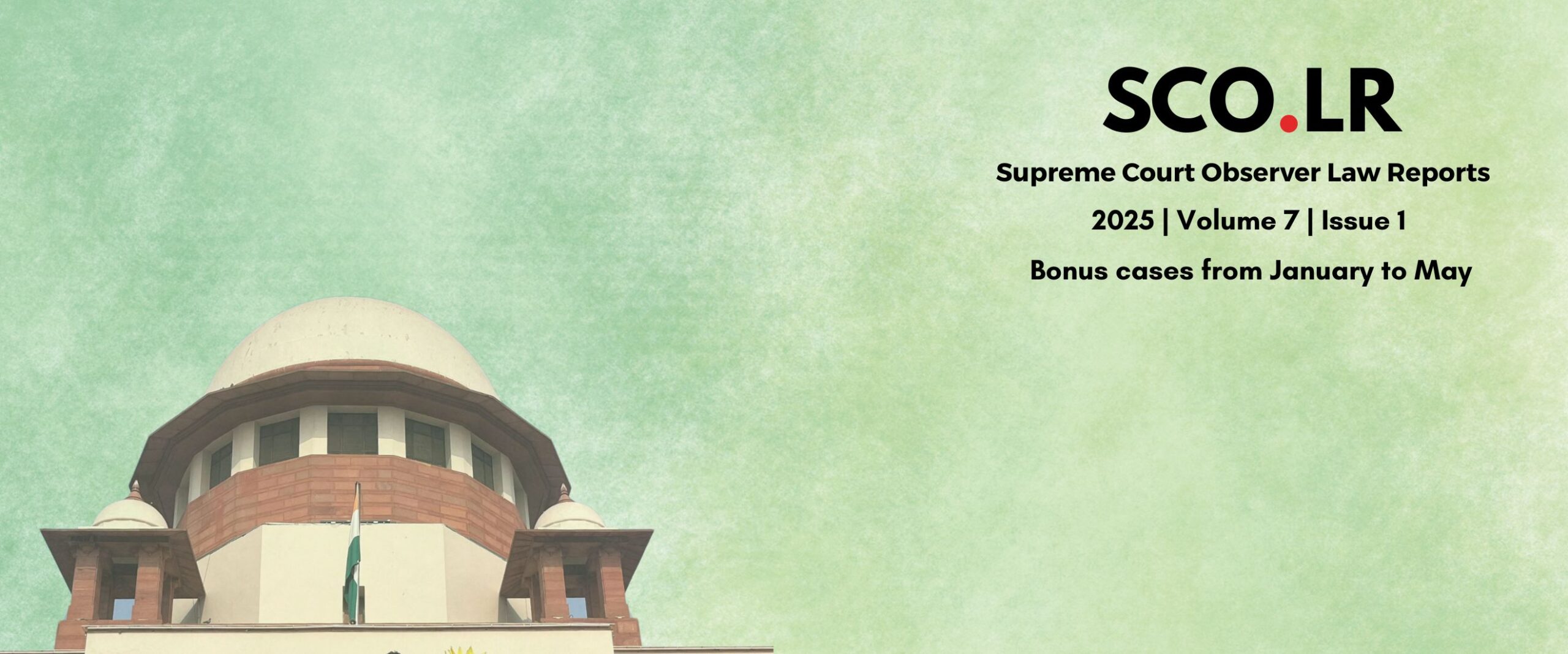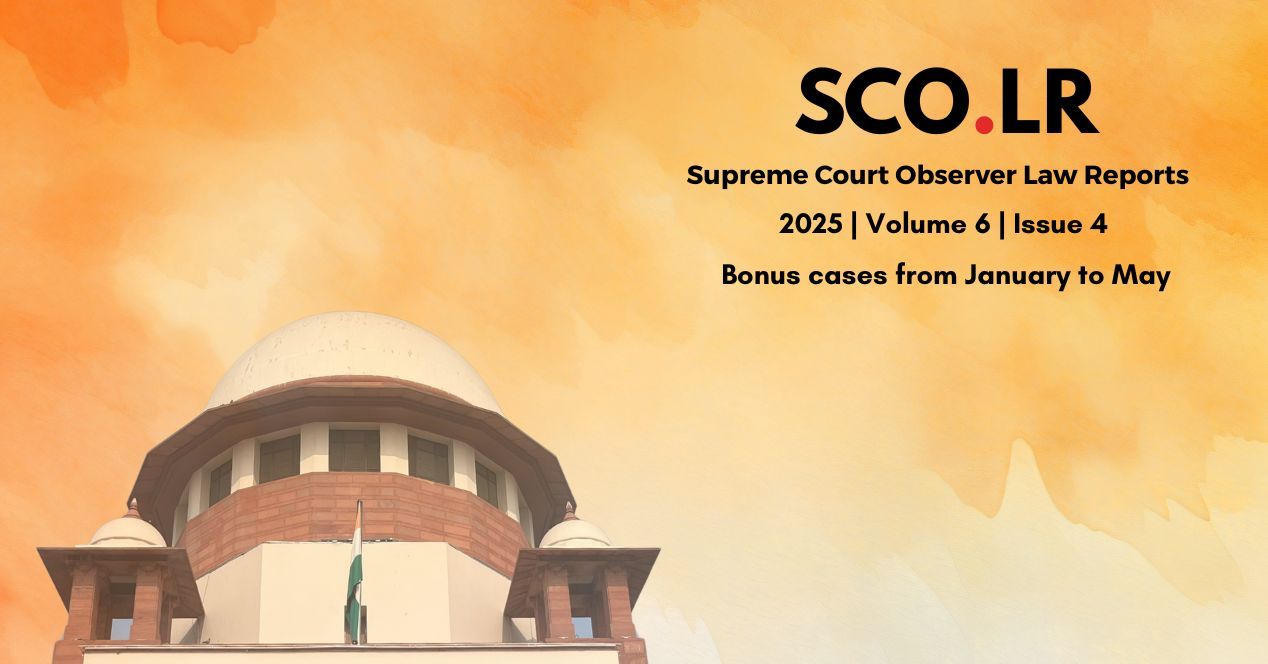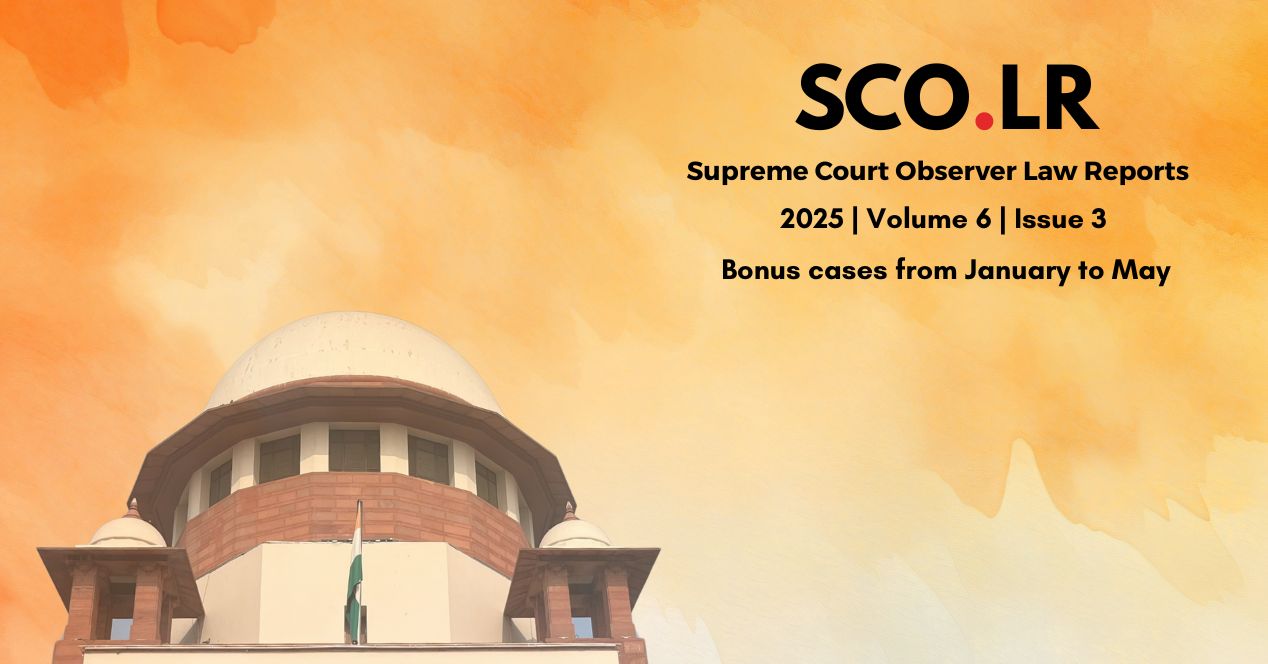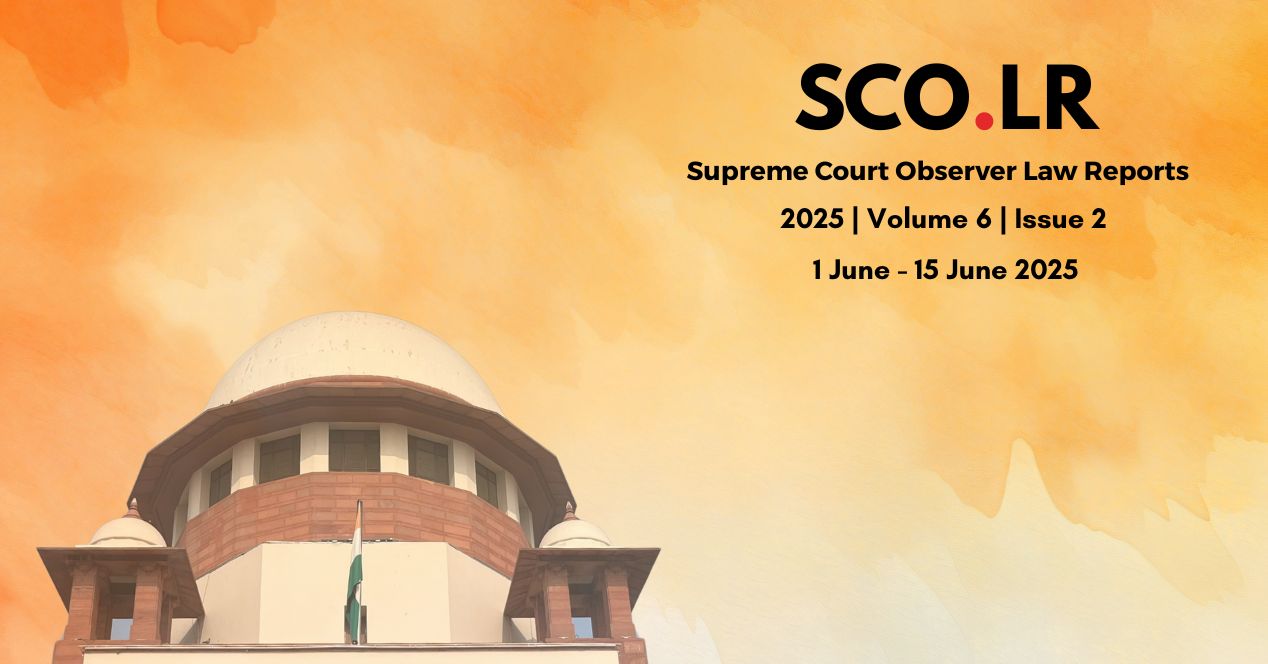Analysis
SCO.LR | 2025 | Volume 7 | Issue 1
In this Issue of SCO.LR, we bring you five bonus unmissable judgements from January to May 2025

We bring you Volume 7 Issue 1 of the Supreme Court Observer Law Reports (SCO.LR). This is the first Issue of SCO.LR for July 2025. This week, we have shortlisted more bonus cases from January to May 2025.
In this issue, we will look at the Court’s emphasis on the right to a fair and unbiased hearing, the application of the Criminal Procedure code to fiscal laws, its calculation of seniority when government employees request transfers, the liability of school management committees when an instance of child sexual abuse takes place on campus, and lastly, the importance of proof when accusing a public servant of taking a bribe.
We’ve also provided HTML versions of the judgements to make your reading and research easier. We’d love to hear from you! Write to us at admin@scobserver.in and let us know what you thought of this issue, and how SCO.LR has supported your research or work.
**********
The Supreme Court Observer Law Reports
2025 SCO.LR |Volume 7 | Issue 1
Bonus Judgements from January– May 2025
**********
Fair Hearing Necessary to Prove Allegations of Bias
Krishandatt Awasthy v State of Madhya Pradesh
29 January 2025
Citation: 2025 INSC 126 | 2025 SCO.LR 7(1)[1]
Bench: Justices Hrishikesh Roy, Sudhanshu Dhulia and S.V. Bhatti
The Supreme Court held that a person must be given a fair opportunity to be heard before establishing the existence of bias.
In 1998, the Janpad Panchayat of Gaurihar appointed 249 school teachers. It was alleged that the selection committee comprised the family members of a few appointees. A Collector set aside the appointments without giving the appointees a chance to make their case. The Madhya Pradesh High Court affirmed the Collector’s decision. A two-judge Bench of the Supreme Court delivered a split verdict on its validity.
A three-judge Bench of the Supreme Court held that there was no ‘reasonable likelihood of bias’ to justify the setting aside of the appointments. It further held that the impleadment of all parties was statutorily mandated.
Keywords/phrases: Panchayat Raj Act Avam Gram Swaraj Adhiniyam, 1993—Section 40(c)—prevents the use of position or influence to secure employment—Collector sets aside appointments—split verdict by two-judge Bench of Supreme Court—Court holds fair hearing is essential
Read the Judgement here.
**********
Safeguards under CrPC Applicable to Warrantless Arrests under Fiscal Laws
Radhika Agarwal v Union of India
27 February 2025
Citation: 2025 INSC 272 | 2025 SCO.LR 7(1)[2]
Bench: Chief Justice Sanjiv Khanna and Justices B.M. Trivedi and M.M. Sundresh
The Supreme Court held that provisions of the Code of Criminal Procedure, 1973 (CrPC), and the Bharatiya Nagarik Suraksha Sanhita, 2023, apply to warrantless arrests under the Customs Act, 1962 and the Central Goods and Services Tax Act, 2017.
In Om Prakash v Union of India (2011), the Supreme Court held that offences under the Customs Act were “non-cognisable” and therefore needed a Magistrate’s warrant before arrest. Subsequently, Parliament amended the 1962 Act, making various offences “cognisable”. Petitions challenged the validity of these amendments.
The Supreme Court dismissed the challenges and held that cognisable offences under the laws will be governed by the safeguards found in the CrPC. It extended the principles laid down in Arvind Kejriwal v Enforcement Directorate (2024), which contained stringent safeguards for warrantless arrests under the Prevention of Money Laundering Act, 2002.
Keywords/phrases: Customs Act, 1962—Central Goods and Services Tax Act, 2017—warrantless arrests—Cognisable Offences—Code of Criminal Procedure, 1973 applies to arrests
Read the Judgement here.
**********
Seniority in Public Appointments is Based on Date of Transfer
Secretary To Government Department Of Health & Family Welfare v K.C. Devaki
25 March 2025
Citation: 2025 INSC 389 | 2025 SCO.LR 7(1)[3]
Bench: Justices P.S. Narasimha and Manoj Misra
The Supreme Court held that when a public services employee requests a transfer for personal reasons, seniority in the new post is determined from the date of the transfer, not from the date of initial appointment.
K.C. Devaki had requested a cadre change from Staff Nurse to First Division Assistant in 1989 on medical grounds. She was transferred to the junior post with her consent. In 2007, she challenged a seniority list and secured favourable orders from both the Karnataka Administrative Tribunal and the Karnataka High Court. The High Court reasoned that her transfer was in the public interest and that her seniority as a First Division Assistant should be counted from her initial appointment as a Staff Nurse in 1979, as per the state’s recruitment and seniority rules.
The Supreme Court set aside the High Court’s order. It observed that self-requested transfers lead to the forfeiture of prior seniority. As Devaki had requested her transfer due to medical reasons, her case fell under Rule 6 of the 1957 Seniority Rules. This Rule distinguishes transfers made in the public interest from those requested by an employee.
Key words/phrases: Karnataka Government Servants (Seniority) Rules, 1957—Rule 6—personal request for transfer—seniority based on date of transfer—not date of initial appointment
Read the Judgement here.
**********
Liability of Managing Committee Members in Child Sexual Offences in School
S.C. Narang v State (NCT of Delhi)
22 April 2025
Citation: 2025 INSC 688 | 2025 SCO.LR 7(1)[4]
Bench: Justices A.S. Oka and Ujjal Bhuyan
The Supreme Court held that a school’s Chairman cannot be considered as “having the actual charge of, or control over” a child under Section 75 of the Juvenile Justice (Care and Protection of Children) Act, 2015 (JJ Act).
A minor was accused of offences under the Protection of Children from Sexual Offences Act, 2012, in an incident which occurred in a school. As the accused was under seven years of age, charges were filed under Section 75 against the Principal, two teachers and the Chairman of the Managing Committee for failing to report or record a case. A Special Court summoned the Chairman for failing to put in place safeguards mandated by law to prevent such instances. The Chairman appealed the order, which the Delhi High Court rejected.
The Supreme Court set aside the High Court’s Order. It held that the child was not under the direct control of the Chairman, under Section 75 of the JJ Act. It found that the Chairman may have a moral duty as a member of the Managing Committee, but that would not attract punishment under Section 75.
Keywords/phrases: Juvenile Justice (Care and Protection of Children) Act, 2015—Section 75—direct control of or charge of child necessary—higher management not considered to have direct control over students
Read the Judgement here.
**********
Proof of demanding bribe a must in cases under the Prevention of Corruption Act
Lokayuktha Police, Davanagere v CB Nagaraj
19 May 2025
Citation: 2025 INSC 736 | 2025 SCO.LR 7(1)[5]
Bench: Justices Pankaj Mithal and Ahsanuddin Amanullah
The Supreme Court held that in order to presume that a public servant took a bribe under Section 20 of the Prevention of Corruption Act, 1988, there should be proof that they demanded it.
A complainant alleged that the respondent demanded and accepted a bribe of ₹1500 to issue a spot inspection report for a validity certificate. The Lokayuktha police found positive fingerprints on the currency notes given to the respondent by the complainant. The Trial Court convicted him under the 1988 Act. The High Court set aside the conviction, reasoning that there was no credible proof of demand.
The Supreme Court upheld the acquittal. It observed that the complainant’s testimony was unreliable and was riddled with factual contradictions. Moreover, the spot inspection report had already been sent before the alleged bribe was given to him. Therefore, the presumption of seeking a bribe does not arise unless the foundational fact of demand is first proved beyond a reasonable doubt.
Keywords/phrases: Prevention of Corruption Act, 1988—Section 20—presumption of undue advantage—proof of demand essential for presumption
Read the Judgement here.




